变化中的英语复习重点总结
英语二轮复习必考点知识点+习题+解析——词性转化及词性变化
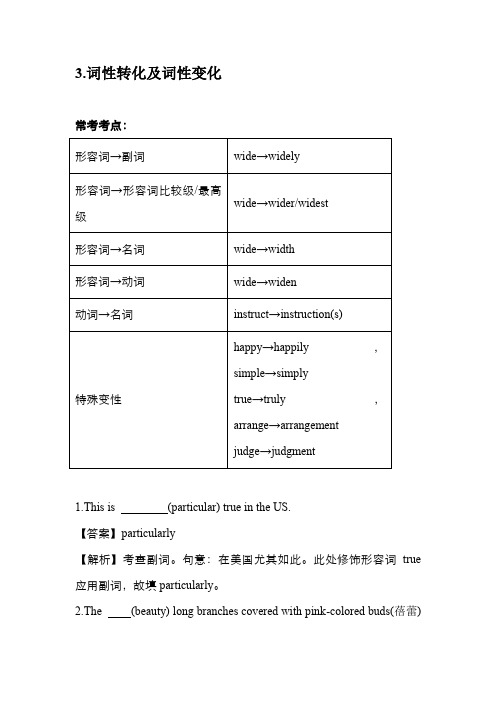
3.词性转化及词性变化常考考点:1.This is (particular) true in the US.【答案】particularly【解析】考查副词。
句意:在美国尤其如此。
此处修饰形容词true 应用副词,故填particularly。
2.The (beauty) long branches covered with pink-colored buds(蓓蕾)make fantastic decorations.【答案】beautiful【解析】考查形容词。
根据The _______ long branches,可判断此处为形容词修饰名词branches,故填beautiful。
3.Historical (accurate) is important but so is entertainment.【答案】accuracy【解析】考查名词。
根据空格前的形容词Historical与空格后的系动词is,判断此处需用名词形式,故填accuracy。
nding on the moon’s far side is (extreme) challenging.【答案】extremely【解析】考查形容词。
根据句子成分分析可知此处需要用副词修饰形容词challenging,故填extremely。
5.Her years of hard work have _____(final) been acknowledged after a customer nominated(提名) her to be Cheshire’s Woman Of The Year.【答案】finally【解析】考查副词用法。
根据空格所处位置可知,此处应用副词形式作状语,修饰谓语动词have been acknowledged,意为最终得以认可,故填finally。
6.It is difficult to figure out a global population of polar bears as much of the range has been (poor) studied.【答案】poorly【解析】考查副词用法。
变化中的英语期末复习

Unit 6 Changing English since the Second World War
本单元介绍了科技与信息时代的英语。 介绍了英语作为世界科技语言、空中交 通语言的特殊地位及其在世界娱乐业和 信息高速公路中的地位。学过本单元后, 学生应能认识和解释科技英语的重要性; 能举例说明英语在信息时代应用的广泛 性。
Unit 5 Trade within and across Language Barriers
本单元介绍了跨语言贸易中的英语。介 绍了pidgin语、creole语、lingua franca 语及其产生原因;英语的创造性;以及 传真英语对国际贸易运作的重要性。学 过本单元后,学生应能举例说明英语的 创造性;能够初步写出传真英语;能在 讨论中说明英语在国际贸易中作为主要 语言的重要性。
2. 总结教材中的重要知识点。 有一些知识点,如英国的发展 史、美国建国史等,并没有在 Summary中总结,学员必须自 己复习。
3. 学习重要的概念和词汇。本教材 有大量的语言学的词汇,比如RP, network English, borrowing, pidgin, creol等,学员必须认真学习,尤其 是《变化中的英语导学》中每一单元 后面的Important Concepts,一定要 复习。此外教材附录的词汇表也供学 有余力的学员复习。
本单元对于英语全球化现象作了反思。 介绍了英语的全球化现象与地区发展不 平衡的关系;英语与其他语种的关系; 以及英语的全球化与英语教学的情况。 学过本单元后,学生应能就英语当前及 未来发展中最感兴趣的问题发表自己的 看法。
“变化中的英语”期末复习
四川电大 张知奇
一、复习方法介绍。
(一)、认真研究中央 电大印发的《变化中的 英语期末复习指导》手 册。
人教版考纲重点词汇词性转化规律总结
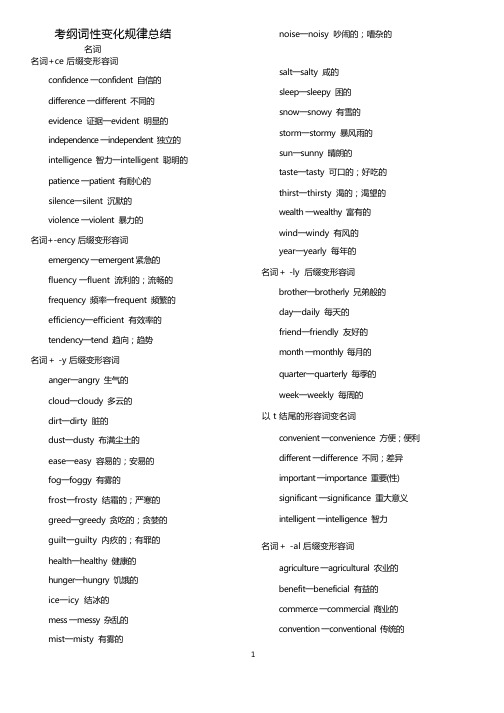
考纲词性变化规律总结名词名词+ce 后缀变形容词confidence 一confident 自信的difference 一different 不同的evidence 证据一evident 明显的independence 一independent 独立的intelligence 智力一intelligent 聪明的patience 一patient 有耐心的silence一silent 沉默的violence 一violent 暴力的名词+-ency 后缀变形容词emergency 一emergent 紧急的fluency 一fluent 流利的;流畅的frequency 频率一frequent 频繁的efficiency一efficient 有效率的tendency一tend 趋向;趋势名词+ -y 后缀变形容词anger一angry 生气的cloud一cloudy 多云的dirt一dirty 脏的dust一dusty 布满尘土的ease一easy 容易的;安易的fog一foggy 有雾的frost一frosty 结霜的;严寒的greed一greedy 贪吃的;贪婪的guilt一guilty 内疚的;有罪的health一healthy 健康的hunger一hungry 饥饿的ice一icy 结冰的mess 一messy 杂乱的mist一misty 有雾的noise一noisy 吵闹的;嘈杂的salt一salty 咸的sleep一sleepy 困的snow一snowy 有雪的storm一stormy 暴风雨的sun一sunny 晴朗的taste一tasty 可口的;好吃的thirst一thirsty 渴的;渴望的wealth 一wealthy 富有的wind一windy 有风的year一yearly 每年的名词+ -ly 后缀变形容词brother一brotherly 兄弟般的day一daily 每天的friend一friendly 友好的month 一monthly 每月的quarter一quarterly 每季的week一weekly 每周的以 t 结尾的形容词变名词convenient 一convenience 方便;便利different 一difference 不同;差异important 一importance 重要(性)significant 一significance 重大意义intelligent 一intelligence 智力名词+ -al 后缀变形容词agriculture 一agricultural 农业的benefit一beneficial 有益的commerce 一commercial 商业的convention 一conventional 传统的culture 一cultural 文化的environment 一environmental 环境的face一facial 表面的music 一musical 音乐的nation一national 国家的nature一natural 自然的;天然的o f ice 一official 官方的origin一original 原来的profession 一professional 专业的season一seasonal 季节的;季节性的society一social 社会的tradition 一traditional 传统的名词/动词+ -ous 后辍变形容词adventure 一adventurous 冒险的continue 一continuous 连续的danger一dangerous 危险的humour 一humorous 幽默的mountain →mountainous 多山的poison一poisonous 有毒的动词+-er 后缀指物的名词小结cooker 炊具counter 柜台drawer 抽屉receiver 听筒;话筒speaker 扬声器typewriter 打字机-ician 后缀高频词汇electrician n.电工magician n.魔术师musician n.音乐家physician n.内科医生politician n.政治家technician n.技术员以-ist 为后缀的高频名词全接触art一artist 艺术家biology →biologistjournal一journalistphysics →physicis t生物学家新闻工作者;记者物理学家piano一pianist 钢琴家psychology一psychologist 心理学家science一scientist 科学家social一socialist 社会主义者special一specialist 专家tour一tourist 游客后缀“-ology”高频名词一览archaeology 考古学biology 生物学ecology 生态学geology 地质学psychology 心理学sociology 社会学technology 技术;工艺名词+ --ic 后缀形容词drama一dramatic 戏剧(性)的energy一energetic 精力充沛的enthusiasm一enthusiastic 热情的romance 一romantic 浪漫的science一scientific 科学的sympathy一sympathetic 同情的名词+ -hood 后缀变名词adult一adulthood 成年boy一boyhood 少年时代brother一brotherhood 手足之情child一childhood 童年man 一manhood 男子气概neighbour一neighbourhood 邻里;街坊-ship 后缀高频名词championship 冠头军衔friendship 友谊hardship 困苦;苦难leadership 领导地位;领导才能membership 成员资格relationship 关系scholarship 奖学金动词+ -y 后缀变名词deliver→delivery 运送discover→discovery 发现recover→recovery 康复;恢复动词+ -ing 后缀变名词begin →beginning 开始;开端build→building 建筑(物)cross→crossing 十字路口end →ending 结局;结尾engine →engineering 工程feel→feeling 感觉hear→hearing 听力market →marketing 促销meet →meeting 会议paint →painting 绘画;油画spend → spendin g 花销suffer→suffering 苦难train →training 训练;培养动词+ -ment 后缀变名词acquire一acquirement n. 取得accomplish 一accomplishment 成就achieve 一achievement 成就adjust一adjustment 调整;调节amuse一amusement 愉快;快乐;消遣announce 一announcement 宣告;述说appoint一appointment 约会;预约;任命argue 一argument 争论arrange一arrangement 安排assess一assessment 评估assign一assignment 分配;任务astonish 一astonishment 惊讶develop 一development 发展disappoint 一disappointment 失望embarrass 一embarrassment 尴尬employ一employment 雇用enjoy一enjoyment 享受;欢乐entertain 一entertainment 款待;娱乐equip一equipment 设备establish 一establishment 建立govern 一government 统治;政府improve 一improvement 提高judge一judgement 判断move一movement 运动;移动punish一punishment 惩罚settle一settlement 定居;解决state一statement 陈述;说明-ive 后缀变形容词act一active 积极的attract一attractive 吸引人的cooperate 一cooperative 合作的impress 一impressive 给人印象深刻的protect一protective 保护的relate一relative 相关的sense一sensitive 敏感的negative 消极的objective 客观的passive 被动的positive 积极的subjective 主观的动词+ -able 后缀变形容词accept一acceptable 可接受的adjust一adjustable 可调节的admire 一admirable 令人钦佩的a f ord 一affordable 负担得起的change一changeable 易变的comfort 一comfortable 舒服的consider一considerable 重要的;相当大的desire一desirable 值得做的;可取的enjoy一enjoyable 令人愉快的favour一favourable 赞成的;有利的forget一forgettable 健忘的honour一honourable 可敬的;光荣的reach一reachable 可获得的;可达到的reason一reasonable 合理的rely一reliable 可靠的;可信赖的remark 一remarkable 不平凡的suit一suitable 合适的understand 一understandable 可理解的value一valuable 宝贵的动词+ -ed 变形容词absorb一absorbed 专心的;聚精会神的accustom一accustomed 习惯的balance →balanced 平衡的bury一buried 专心的complicate →complicated 复杂的determine 一determined 坚定的;有决心的devote一devoted 忠实的experience →experienced 有经验的learn →learned 博学的limit →limited 有限的organize 一organized 有组织的suppose一supposed 应该的relate →related 相关的skill →skilled 熟练的unit →united 联合的;统一的动词+ -ing/+ -ed 变形容词amuse一amusing 好笑的;有趣的一amused 愉快的astonish 一astonishing 令人惊讶的一astonished 感到惊讶的bore一bored 厌烦的一boring 令人厌烦的confuse一confusing 令人迷惑的一confused 感到迷惑的convince 一convincing 令人信服的一convinced 坚信不移的depress一depressing 令人沮丧的一depressed 沮丧的disappoint 一disappointed 失望的一disappointing 令人失望的disturb 一disturbing 令人不安的;引起烦恼的一disturbed 扰乱的;精神失常的embarrass 一embarrassing 令人尴尬的一embarrassed 尴尬的excite一excited 兴奋的一exciting 令人兴奋的frighten 一frightened 害怕的一frightening 令人害怕的relax一relaxing 使人放松的一relaxed 轻松的satisfy一satisfying 令人满意的一satisfied 对……满意的shock一shocked 震惊的一shocking 令人震惊的surprise 一surprised 吃惊的一surprising 令人吃惊的tire一tired 疲劳的一tiring 令人疲劳的动词+ -tion 后缀变名词accelerate 一acceleration 加速accumulate 一accumulation 积累adapt一adaptation 适应;改编addict一addiction 沉溺;嗜好admire 一admiration 羡慕advocate 一advocation 拥护apply一application 申请appreciate 一appreciation 感激;欣赏assume 一assumption 假定;设想celebrate 一celebration 庆祝classify一classification 分类;归类combine 一combination 联合congratulate 一congratulation 祝贺construct 一construction 建筑物consume 一consumption 消费contradict 一contradiction 反驳contribute 一contribution 贡献cooperate 一cooperation 合作correct一correction 改正;纠正create一creation 创造;创建declare 一declaration 宣言;公告decorate 一decoration 装饰decorate 一decoration 装饰determine 一determination 决心digest一digestion 消化elect一election 竞选;选举erupt一eruption 火山爆发evaluate 一evaluation 评估exhibit一exhibition 展览;展览会expect一expectation 期望;期待fascinate 一fascination 魅力;入迷graduate 一graduation 毕业graduate 一graduation 毕业hesitate 一hesitation 犹豫;踌躇imagine 一imagination 想象immigrate 一immigration 迁移;移居indicate 一indication 指示;暗示infect一infection 传染interrupt一interruption 中断object一objection 反对occupy一occupation 占领;占据organize 一organization 组织pollute一pollution 污染predict一prediction 预言prepare一preparation 准备protect一protection 保护recommend 一recommendation 推荐;介绍reflect一reflection 思考;反映regulate 一regulation 规则;规章reject一rejection 拒绝;抛弃relax一relaxation 放松satisfy一satisfaction 满意;满足starve一starvation 挨饿;饿死substitute 一substitution 代替;取代translate 一translation 翻译transport 一transportation 交通动词+ -ure 后缀变名词press一pressure 压力please一pleasure 乐事;快乐expose一exposure 暴露;揭发fail一failure 失败mix 一mixture 混合物动词+ -sion 后缀变名词admit一admission 容许;承认permit一permission 允许impress 一impression 印象express一expression 表情;表达revise一revision 复习possess →possessio n 拥有conclude →conclusion 结论confuse →confusion 困惑;混淆decide →decision 决定动词/形容词+ -ance 后缀变名词guide一guidance 指导tolerate 一tolerance 宽容ignore一ignorance 无知;愚昧appear一appearance 出现important 一importance 重要(性)elegant一elegance 优雅大方assist一assistance 援助resist一resistance 抵抗guide一guidance 指导annoy一annoyance 恼怒形容词+ -ity 后缀变名词electric 一electricity 电;电流;电学equal一equality 平等major一majority 大多数popular一popularity 受欢迎;流行real一reality 现实secure一security 安全similar一similarity 相似点以“-ity”结尾的高频名词荟萃cruelty 残忍diversity 多样性necessity 必需品;需要possibility 可能性security 安全similarity 相似(性)形容词+ -en 后缀变动词bright→brighten 使愉快;使明亮broad→broaden 加宽;拓宽dark一darken 使变暗deep一deepen 加深;使变深fright一frighten (使)惊吓hard一harden 使变硬light一lighten 使变轻long一lengthen 加长loose→loosen (使)变松;放松;松开quick一quicken 加快ripe一ripen 变成熟;使成熟sharp→sharpen 磨快;使锋利short一shorten 变短;缩短soft一soften 使变软strong一strengthen 加强weak一weaken 使变弱wide→widen 加宽;拓宽形容词+ -th 变名词deep一depth 深;深处grow一growth 成长long一length 长;长度strong一strength 力量true一truth 真理warm一warmth 温暖wide一width 宽度形容词+ -ness 后缀变名词aware一awareness 意识careless 一carelessness 粗心大意conscious 一consciousness 知觉dark一darkness 黑暗eager一eagerness 渴望happy一happiness 幸福;高兴kind一kindness 仁慈;好意lonely一loneliness 孤独rude一rudeness 粗鲁sad一sadness 悲哀;悲伤sick一sickness 疾病weak一weakness 弱点;虚弱willing 一willingness 愿意含-ious 的形容词一览ambitious 有雄心的;野心勃勃的cautious 小心的;谨慎的conscious 有意识的envious 忌妒的;猜忌的mysterious 神秘的religious 宗教上的;信奉宗教的;虔诚的以“-ical”结尾的形容词一览economical 经济的;节约的electrical 与电有关的historical 与历史有关的logical 逻辑的magical 神奇的;像变魔术似的musical 音乐的;悦耳的political 政治的形容词+ -ly 后缀变副词fluent一fluently 流利地frequent一frequently 频繁地;经常地actual一actually 实际上entire一entirely 完全;全部地gradual一gradually 逐渐地fortunate 一fortunately 幸运地final一finally 最后extreme 一extremely 极其反义词动词+dis-前缀变否定词agree→disagree 不同意appear→disappear 消失appoint→disappoint 使失望approve→disapprove 反对;不赞成comfort→discomfort 使不舒适cover→discover 发现like→dislike 不喜欢形容词+in- 前缀变否定词accurate 一inaccurate 不精确的adequate一inadequate 不充分的appropriate 一inappropriate 不合适的expensive 一inexpensive 不贵的;便宜的experienced 一inexperienced 经验不足的形容词+im-前缀变否定词patient一impatient 不耐心的polite一impolite 没礼貌的possible 一impossible 不可能的practical 一impractical 不实用的proper一improper 不合适的形容词+un- 前缀变否定词able一unable 不能的aware一unaware 不知道的believable 一unbelievable 不可相信的certain 一uncertain 不确定的clear一unclear 不清楚的comfortable 一uncomfortable 不舒服的common 一uncommon 不常有的conscious 一unconscious 失去知觉的fair一unfair 不公平的forgettable 一unforgettable 难忘的fortunate 一unfortunate 不幸的fit一unfit 不合适的friendly一unfriendly 不友好的happy一unhappy 不高兴的;不幸福的known一unknown 无名的likely一unlikely 不可能的lucky一unlucky 不幸的necessary一unnecessary 不必要的pleasant一unpleasant 不愉快的unfortunate 不幸的unimportant 不重要的usual一unusual 不寻常的willing 一unwilling 不情愿的后缀-less 构成的形容词集锦aim一aimless 无目的的care一careless 粗心大意的count →countless 无数的doubt →doubtless 无疑的end一endless 无尽的harm一harmless 无害的help一helpless 无助的home一homeless 无家可归的hope一hopeless 无希望的job一jobless 失业的limit一limitless 无限的rest →restless 不安的use一useless 无用的含 mis-前缀的动词集锦mistake 误会misunderstand 误解misuse 误用;滥用mislead 误导mistrust 不信任其他使动用法“前缀 en- +形容词/名词”变动词rich一enrich 使充实able一enable 使能够large 一enlarge 使扩大sure一ensure 确保;担保danger一endanger 使……遭遇危险title一entitle 给……起题目/命名courage一encourage 鼓励含 fore-前缀的单词forecast vt. 预报;预测foresee vt. 预见;预料;预知foreword n. 前言forehead n. 额头forearm n. 前臂forehead n. 额头forearm n. 前臂forecast vt. 预报foresee vt. 预见;预知foreword n. 前言foretell v. 预言;预示“-ward”后缀方位词southward 向南northward 向北eastward 向东westward 向西upward 向上backward 向后以后缀-ify 结尾的动词simple 一simplify 简化beauty一beautify 美化pure一purify 净化identity一identify 鉴定;识别出class一classify 分类动词+re-前缀变动词cycle一recycle 再利用;回收利用use一reuse 重新使用build一rebuild 重建write一rewrite 重写tell一retell 复述男女有别(|steward 乘务员;服务员〈|stewardess 女乘务员(|waiter 男服务员〈|waitress 女服务员(|actor 男演员〈|actress 女演员(|host 男主人〈|hostess 女主人现在分词/过去分词用作介词或连词小结assume 一assuming 假设;假定include一including 包含;包括suppose一supposing 假设;假如provide 一provided/providing 假设;如果consider一considering 鉴于;考虑到concern一concerning 关于give一given 鉴于;考虑到。
特殊名词变化背记清单-——高三英语上学期一轮复习专项

特殊名词变化背记清单一、名词的特殊复数形式:(一) 不规则名词复数:1. child ---children小孩2. foot --- feet脚3.toot--- teeth牙齿4. goose --- geese鹅5. mouse ---mice老鼠6. ox ---oxen 公牛7. analysis --- analyses分析8. crisis --- crises危机9. thesis --- theses论文10. man --- men男人11. woman --- women女人12. medium --- media 媒体13.basis --- bases基础14. datum--- data数据15. bacterium --- bacteria细菌16. criterion --- criteria标准17. phenomenon --- phenomena现象18. German --- Germans 德国人19. Frenchman--- Frenchmen 法国人20. Englishman ---Englishmen 英国人(二) 有些名词单复数同型:1. Chinese --- Chinese中国人2. Japanese --- Japanese日本人3. Swiss--- Swiss瑞士人4. spacecraft --- spacecraft 航天器5. aircraft --- aircraft 飞机6.headquarters---headquarters 总部7. means ---means 方式8. species --- species 物种9. news --- news 消息10. deer --- deer 鹿11. fish --- fish鱼12. sheep --- sheep 绵羊(三) 有些以f结尾的名词变复数直接加s:1.belief --- beliefs 信念2.roof --- roofs 屋顶3.cliff --- cliffs 悬崖4.staff --- staffs 员工5.proof --- proofs 证据6.chief --- chiefs 首领7.gulf --- gulfs 海湾8.grief --- griefs 伤心事9.serf --- serfs 农奴10.safe --- safes 保险箱(四) “单位”名词的单复数:1. dollar--- dollars美元2. franc--- francs法郎3. yuan --- yuan 元4. meter/metre --- meters 米5. jin --- jin 斤6. mu --- mu 母(五) 复合名词的复数形式:1. looker-on --- lookers-on旁观者2. passer-by --- passers-by过路人3. man doctor --- men doctors男医生4. woman teacher -- women teachers 女老师5 brother-in-law -- brothers-in -law 姐夫(妹夫)6. sister-in-law --- sisters-in-law 嫂子(弟媳)7. mother-in-law --- mothers-in-law 岳母(婆婆)8. father-in-law --- fathers-in-law 岳父(公公二、下列名词没有单数形式, 是复数概念,在句中作主语时谓语动词用复数形式:1. clothes2. police3. cattle4. people三、下列名词的单复数含义不同:1. paper纸--- papers试卷,文件,论文2. good 好的--- goods 货物3. ash 灰--- ashes 骨灰,遗骸4. glass 玻璃--- glasses 眼镜5. sand 沙子--- sands 沙滩6. wood 木材--- woods 树林7. green绿色的---greens 青菜8. time 时间--- times 时代9. drink酒--- drinks 饮料10. arm 手臂--- arms 武器11. look看---looks 外表,面容12. line 线--- lines 台词13. manner方式,样式---manners 礼貌,规矩14. work 工作--- works 工厂,作品,工事15. damage 损害---damages 损失赔偿费,费用16. cloth 布--- clothes 衣服17. pain 疼痛--- pains 辛劳,痛苦18. ruin 毁坏--- ruins 废墟19. fruit 水果--- fruits 各种水果20. noise 噪音--- noises 各种噪音21. color 颜色--- colors 各种颜色22. custom 风俗;习惯--- customs 海关23. fish 鱼肉--- a fish鱼24. chicken 鸡肉--- a chicken 小鸡25. tin 锡--- a tin 罐头26. relation 关系--- a relation 亲戚,亲属27. iron 铁--- an iron 熨斗28. beauty 美丽--- a beauty 美人,美的东西29. power 威力;力量;电力--- a power 大国30. room空间--- a room 房间31. glass 玻璃--- a glass 玻璃杯32. success成功--- a success 一个成功的人(事)33. communication 通讯;交流--- communications 通讯系统,通讯工具34. convenience 方便,便利--- conveniences便利设备35. necessity 需要,必要性--- necessities 必需品四、构词法----名词和动词的相互转化:1. 很多动词可以转化为名词:1) have a look ( chat, talk, wash, swim, rest, try, quarrel, interview, taste, slip, ect.)2) make a study ( guess, call, survey, change, answer, slip, visit, appointment ect.)3) come to a stop (a pause, an end, ect.)2. 有些名词也可当动词用:1) Have you booked your ticket? (预订)2) The hall can seat two thousand people. (容纳)3) We’ll back you up. (支持)4) We’ll head for Shanghai tomorrow. (朝….前进)5) If so, you will be badly fooled. (上当,愚弄)6) They were hosted by the members of the embassy. (招待)7) This helped to bridge over our difficulties. (度过)8) Over three hundred students stormed into the building. (涌入;冲进)五、注意下列动词形容词变化的名词:1. grow growth2. warm warmth3. true truth4. repeat repetition5. describe description6. argue argumentpete competition8.necessary necessity9.recognize recognition10.decide decision11.confuse confusion12.divide division13.relax relaxation14.pronounce pronunciation15.propose proposal16.arrive arrival 17.refuse refusal18.survive survival19.remove removal20.approve approval21.proud pride22.dry drought23.permit permission24.discover discovery25.speak speech26.fortunate fortune27.differ difference28.strong strength29.marry marriagerm information31.popular popularity32.succeed success六、用名词的正确形式填空:1.There are two ____________ (box) of ____________ (match), three ____________ (knife), four____________ (brush), five ____________ (key), six ____________ (photo), seven ____________ (dictionary), eight ____________ (tomato), nine ____________ (glass), ten ____________ (radio) and eleven ____________ (toy bus) on that table.2.Look at those ____________ (wolf), ____________ (sheep), ____________ (deer), ____________(fox), ____________(ox) ____________ (monkey), and ____________ (goose).3.Who are they? They are all ____________ (hero). And they are all ________________ (woman doctor)4.There are so many public____________ (convenience) in cities .5.Three ____________ (Swiss), two ____________(German) and five _____________(Frenchman) arepresent at the meeting.6.Those little _____________(child) are playing with those little____________ (mouse).7.The rainbow is one of the most beautiful ____________ (phenomenon) in nature.8.Two____________(aircraft) and two__________(spacecraft) are being designed in the___________(headquarters).9.We have tried all the ________(means), but not every_________(means) has worked.10.It tastes like________(chicken). Do you raise ________ (chicken)?11.He regarded music as one of life's ____________ (necessary).12.They took great __________ (proud) in their excellent children.13.English __________________ (pronounce) is terribly difficult.14.The job involved the constant _____________ (repeat) of the same movements15.The police have issued a detailed ______________ (describe) of the missing woman.16.The ____________ (consume) of alcohol on the premises(经营场所)is forbidden.17.Sometimes there's a lot of ____________ (compete) between children for their mother's attention.18.There is general_________ (recognize) that the study techniques of many students are weak.19.The news aroused a lot of _____________ (curious) among local people.20.The fear of unemployment can be a source of deep ___________ (anxious) to people.21.I think the government has lost touch with___________ (real).22.The lake has more than 20 _______________ (vary) of fish.23.We need an effective strategy to fight ____________ (poor).24.This latest interview was further __________ (prove) of how good at her job Cara was.25.Several members hold very right-wing _________(believe) .26.This year (a) severe ___________ (dry) has ruined the crops.27.With seven people squashed(塞入)in one house, you don't get much ___________ (private).28.In most people’s eyes, she was nothing more than a common ___________ (crime).29.It was his ___________ (brave) that saved the child.30.Meditation allows you to enter a state of deep_____________(relax) .31.The thought occurred to me that he might not be telling the _________(true).32.All at once they were aware of the evening of light and___________ (warm).33.We finally came to a firm _________ (decide) on the matter.34.The French government has approved ___________ (propose) for a new waste law.35.The party hopes to win the _____________ (argue) about how to reform the health systemkey名词key: 1. boxes, matches, knives, brushes, keys, photos, dictionaries, tomatoes, glasses, radios, buses2. wolves, sheep, deer, foxes, oxen, monkeys, geese3. heroes, women doctors4. conveniences5. Swiss, Germans, Frenchmen6. children, mice7. phenomena 8. aircraft, spacecraft, headquarters9. means, means 10. chicken, chickens11. necessities 12. pride 13. pronunciation 14. repetition 15. description 16. consumption17. competition 18. recognition 19. curiosity 20. anxiety 21. reality 22. varieties23. poverty 24. proof 25. beliefs 26. drought 27. privacy 28. criminal 29. bravery30. relaxation 31. truth 32. warmth 33. decision 34. proposals 35. argument高考质量提升是一项系统工程,涉及到多个方面、各个维度,关键是要抓住重点、以点带面、全面突破,收到事半功倍的效果。
Changes Unit 5 What will I be like知识点总结-牛津
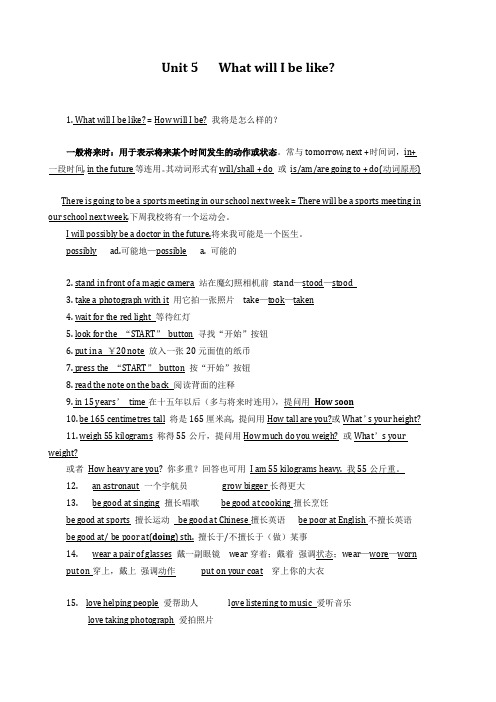
Unit 5 What will I be like?1. What will I be like? = How will I be? 我将是怎么样的?一般将来时:用于表示将来某个时间发生的动作或状态。
常与tomorrow, next +时间词,in+一段时间, in the future等连用。
其动词形式有will/shall + do 或is/am/are going to + do(动词原形)There is going to be a sports meeting in our school next week = There will be a sports meeting in our school next week.下周我校将有一个运动会。
I will possibly be a doctor in the future.将来我可能是一个医生。
possibly ad.可能地—possible a. 可能的2. stand in front of a magic camera 站在魔幻照相机前stand—stood—stood3. take a photograph with it 用它拍一张照片take—took—taken4. wait for the red light 等待红灯5. look for the “START”button 寻找“开始”按钮6. put in a ¥20 note 放入一张20元面值的纸币7. press the “START”button 按“开始”按钮8. read the note on the back 阅读背面的注释9. in 15 years’time在十五年以后(多与将来时连用),提问用How soon10. be 165 centimetres tall 将是165厘米高, 提问用How tall are you?或What’s your height?11. weigh 55 kilograms 称得55公斤,提问用How much do you weigh? 或What’s your weight?或者How heavy are you? 你多重?回答也可用I am 55 kilograms heavy. 我55公斤重。
干货小学英语句型转换及必考重点知识点!
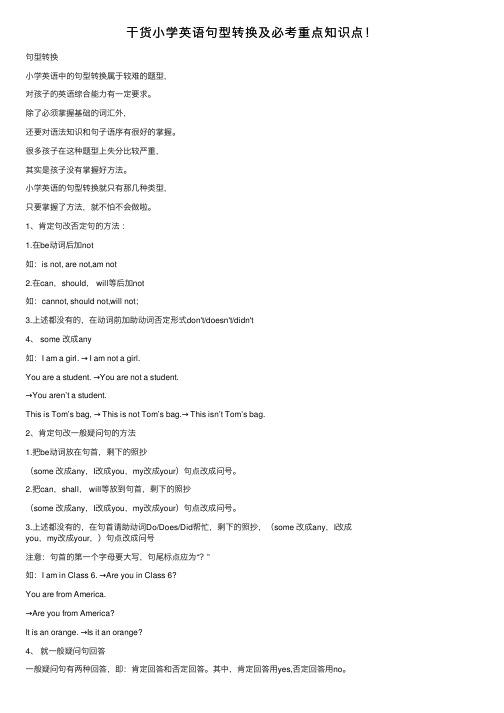
⼲货⼩学英语句型转换及必考重点知识点!句型转换⼩学英语中的句型转换属于较难的题型,对孩⼦的英语综合能⼒有⼀定要求。
除了必须掌握基础的词汇外,还要对语法知识和句⼦语序有很好的掌握。
很多孩⼦在这种题型上失分⽐较严重,其实是孩⼦没有掌握好⽅法。
⼩学英语的句型转换就只有那⼏种类型,只要掌握了⽅法,就不怕不会做啦。
1、肯定句改否定句的⽅法:1.在be动词后加not如:is not, are not,am not2.在can,should, will等后加not如:cannot, should not,will not;3.上述都没有的,在动词前加助动词否定形式don't/doesn't/didn't4、 some 改成any如:I am a girl. → I am not a girl.You are a student. →You are not a student.→You aren’t a student.This is Tom’s bag, → This is not Tom’s bag.→ This isn’t Tom’s bag.2、肯定句改⼀般疑问句的⽅法1.把be动词放在句⾸,剩下的照抄(some 改成any,I改成you,my改成your)句点改成问号。
2.把can,shall, will等放到句⾸,剩下的照抄(some 改成any,I改成you,my改成your)句点改成问号。
3.上述都没有的,在句⾸请助动词Do/Does/Did帮忙,剩下的照抄,(some 改成any,I改成you,my改成your,)句点改成问号注意:句⾸的第⼀个字母要⼤写,句尾标点应为“?”如:I am in Class 6. →Are you in Class 6?You are from America.→Are you from America?It is an orange. →Is it an orange?4、就⼀般疑问句回答⼀般疑问句有两种回答,即:肯定回答和否定回答。
六年级英语知识点重难点
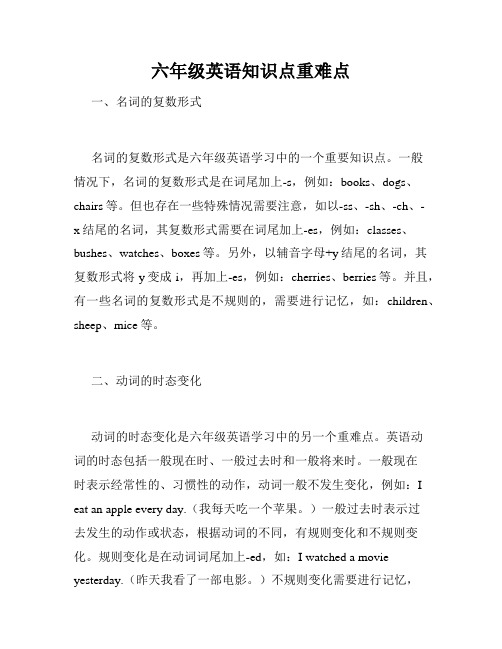
六年级英语知识点重难点一、名词的复数形式名词的复数形式是六年级英语学习中的一个重要知识点。
一般情况下,名词的复数形式是在词尾加上-s,例如:books、dogs、chairs等。
但也存在一些特殊情况需要注意,如以-ss、-sh、-ch、-x结尾的名词,其复数形式需要在词尾加上-es,例如:classes、bushes、watches、boxes等。
另外,以辅音字母+y结尾的名词,其复数形式将y变成i,再加上-es,例如:cherries、berries等。
并且,有一些名词的复数形式是不规则的,需要进行记忆,如:children、sheep、mice等。
二、动词的时态变化动词的时态变化是六年级英语学习中的另一个重难点。
英语动词的时态包括一般现在时、一般过去时和一般将来时。
一般现在时表示经常性的、习惯性的动作,动词一般不发生变化,例如:I eat an apple every day.(我每天吃一个苹果。
)一般过去时表示过去发生的动作或状态,根据动词的不同,有规则变化和不规则变化。
规则变化是在动词词尾加上-ed,如:I watched a movie yesterday.(昨天我看了一部电影。
)不规则变化需要进行记忆,如:I went to the park last weekend.(上周末我去了公园。
)一般将来时表示将来要发生的动作,可以用“will + 动词原形”的结构构成,例如:I will go to the library tomorrow.(我明天要去图书馆。
)三、形容词的比较级和最高级形容词的比较级和最高级是六年级英语学习中的又一个重难点。
形容词的比较级用于比较两个事物的程度,一般在形容词前面加上-more或者-er来构成,例如:She is taller than her brother.(她比她弟弟高。
)形容词的最高级用于比较三个或者三个以上事物的程度,一般在形容词前面加上-the most或者-est来构成,例如:She is the tallest girl in the class.(她是班上最高的女孩。
九年级英语变形总结知识点

九年级英语变形总结知识点In English grammar, transformation refers to the process of changing the form of a word, phrase, or sentence without changing its meaning. This is a fundamental aspect of language that allows us to convey different shades of meaning and express ourselves more precisely.In this summary, we will cover the various types of transformations in English, including word formation, sentence transformation, and transformation of phrases. We will also discuss the rules and patterns that govern these transformations, as well as provide examples and exercises to help solidify your understanding.1. Word FormationWord formation refers to the process of creating new words from existing ones by adding affixes, changing the word's ending, or combining words. There are several common types of word formation, including:- Prefixes: Prefixes are added to the beginning of a word to change its meaning. For example, the prefix "un-" can be added to the word "happy" to create the word "unhappy," which means not happy.- Suffixes: Suffixes are added to the end of a word to change its meaning or function. For example, the suffix "-able" can be added to the word "comfort" to create the word "comfortable," which means able to be comforted.- Compound Words: Compound words are formed by combining two or more words to create a new word with a distinct meaning. For example, "tooth" and "brush" can be combined to create the word "toothbrush."- Conversion: Conversion involves changing the function or part of speech of a word without adding any affixes. For example, the noun "access" can be converted into the verb "access," meaning to gain entry to.2. Sentence TransformationSentence transformation refers to the process of changing the form or structure of a sentence while preserving its original meaning. There are several common types of sentence transformation, including:- Active to Passive: In this transformation, the subject and object of the active sentence are switched, and the verb is changed to its passive form. For example, "The cat chased the mouse" (active) can be transformed into "The mouse was chased by the cat" (passive).- Direct to Indirect Speech: In direct speech, the exact words spoken by a person are quoted within quotation marks, while in indirect speech, the speaker's words are reported without quotation marks. For example, "She said, 'I am going to the store'" (direct) can be transformed into "She said that she was going to the store" (indirect).- Question to Statement: In this transformation, a question is rephrased as a statement. For example, "Does he like ice cream?" can be transformed into "He likes ice cream."3. Transformation of PhrasesPhrases in English can also be transformed by changing their form or structure. There are several common types of phrase transformations, including:- Change of Part of Speech: Phrases can be transformed by changing the part of speech of one or more of the words in the phrase. For example, the noun phrase "a cup of tea" can be transformed into the adjective phrase "a tea cup."- Change of Voice: Phrases can be transformed from active voice to passive voice, or vice versa, by changing the form of the verb. For example, the phrase "the cat caught the mouse" (active) can be transformed into "the mouse was caught by the cat" (passive).- Change of Preposition: Phrases can be transformed by changing the preposition used, which can alter the meaning or function of the phrase. For example, the phrase "in the box" can be transformed into "on the box," changing the location of the object.4. Rules and PatternsThere are several rules and patterns that govern word formation, sentence transformation, and transformation of phrases in English. These include:- The order and placement of affixes in word formation, such as adding a prefix before the base word and a suffix after the base word.- The use of auxiliary verbs and tense changes in sentence transformation, such as using "was" for past continuous tense in passive voice.- The use of context and logic in determining the correct transformation of phrases, such as choosing the appropriate preposition based on the meaning of the phrase.5. Examples and ExercisesTo better understand and practice transformation in English, it is helpful to work through examples and exercises. Here are a few examples and exercises to get you started:- Example: Transform the following adjective into a noun using the suffix "-ness." Happy- Exercise: Change the following sentence from active voice to passive voice. The boy kicked the ball.- Example: Change the following noun phrase into a verb phrase. A cup of tea- Exercise: Transform the following direct speech into indirect speech while preserving the original meaning. "I am going to the party," she said.By studying and practicing these examples and exercises, you can improve your proficiency in transformation and become more confident in using English grammar. Remember to pay attention to the rules and patterns that govern word formation, sentence transformation, and transformation of phrases, and to practice regularly to reinforce your understanding. In conclusion, transformation is a fundamental aspect of English grammar that allows us to convey different shades of meaning and express ourselves more precisely. By understanding the various types of word formation, sentence transformation, and transformation of phrases, as well as the rules and patterns that govern these transformations, you can improve your proficiency in English and become a more effective communicator. Keep practicing and challenging yourself with examples and exercises, and you will continue to grow and expand your language skills.。
- 1、下载文档前请自行甄别文档内容的完整性,平台不提供额外的编辑、内容补充、找答案等附加服务。
- 2、"仅部分预览"的文档,不可在线预览部分如存在完整性等问题,可反馈申请退款(可完整预览的文档不适用该条件!)。
- 3、如文档侵犯您的权益,请联系客服反馈,我们会尽快为您处理(人工客服工作时间:9:00-18:30)。
变化中的英语复习重点总结1.全世界语言→ 4000-5000种(P7)2.Dead language → no living speakers (P7)3.Historical variation → variation over timeRegional variation → variation in different places (P15)4.RP Standard English Network English:Standard English → Written EnglishRP → Received Pronunciation ( Also Southern Educated British English)Network English → Educated American English (P19)5.V ocabulary change in English (P23-24)6.词汇来源:Borrowing(e.g dim sum), Abbreviations(e.g MTR), Translations(e.g dragonboat)(P28-29)7.英国语言→English, Welsh(Wales地区) Gaelic (Scotland地区)( P36)8.Dialects→ Different ways of speaking the same languageAccent → We are talking only about the sounds of the language in some places (P39)nguage family:English →Indo-European family(印欧语系)Chinese → Sino-Tibetan family(汉藏语系) P6410.英国历史上三次被入侵:1) BC 1st– AD 5th→Latin- speaking Romans 来自Mediterranean2)AD 5th - 8th and 9th→ Scandinavian斯堪的纳维亚人(Angles盎格鲁人, Saxons撒克逊部族, Jutes朱特族人) invaded Britain 来自North West Europe3)AD 11th→French-speaking Normans 来自Normandy(P69-70)11.Standard English:A: Come from → South EastB: Reason →. Its importance is matter of culture and history(P75 )13. A good English dictionary contains about 450,000 separate entries.(P86)14.Receptive(听读) →You recognize a word and know what it means.Productive(说写)→You can say a word or you can write it.NOTE: 每个人的Receptive knowledge of vocabulary要大于Productive knowledge (P89-90)15.Prescriptive teaching(说明性教学) →correct students’ mistakesProductive teaching(输出性教学) → Practice students’ English by speaking and writing.Descriptive teaching(描述性教学) → Tell students how English has changed and come to beas it is now. P100 P10318.美国历史(The New World: the continent of America:)1584, 1585 Sir Walter Releigh’s two expeditions to the New World1620→English Puritan Playmouth Mayflower1775 → American war of Independence started1785 → End of the A set up1790 → First census人口普查held. About 90%of the population of British descent后裔P120-12119. The US A → The melting-potIn New York harbour → You ca n see the Statue of Liberty P122-12321. 印度英语发展历史:The East India Company → Started in 17 century, by 1813, it came toan end.19th century → The English man named Macaulay was called the President of theCommittee of Public Instruction,set up universities ofEnglish language P138-13922. 澳大利亚Australia 形成,Captain Cook lead the first exploration in 1770astronomical observation18th century: penal colony (罪犯流放地) (P140-141)23.Inner Circle, Outer Circle and Expanding Circle →Braj Kachru, from the sub-continent of Indiadeveloped the idea of classifying the internationaluse of English.Inner Circle: native speakers-users mother tongueBritain, North America, Australia New Zealand, South AfricaOuter Circle: taught in schools, international and official businessIndian Hong KongExpanding Circle: not an official language , international use P14724. Esperanto世界语→具有全球扩广的语言特征,且适合全球使用的理想语言What an ideal language for global use 理由P158-159Artificial language → The failed reason (p160-161)Simplify a natural language → Noah Webster made English spelling easier for the children Basic English →designed by C.K.Ogden in 1930, only 850 words P161-16225. Social Variation →speakers use English differently with their social and educational level.Languages are equal, no primitive or underdeveloped language p16626. Dead languages → Latin and Sanskrit(梵语)French, Spanish and Portuguese are descendants of Latin p17027. Pygmalion → He is a craftsmen from Greek empire, made a sculptor named Galatea. And heloves her and she came lived.My Fair Lady → Wrote by George Bernard Shaw, a famous Irish playwright. P182-183 28. False beginners → The students who have forgotten the early stages of learning a languageThe first stage of learning → Learning the rules of the sound system, the grammar, the writing system, and the vocabulary.The second stage of learning → Using English in a variety of ways. P187-18829. The rules of writing English → p202A. Always make sure your sentences are complete.B. Every sentence must hace a subject and a verb.C. Never put a preposition at the end of the sentence.D. Never use slang(俚语) or even informal words.30. T he components of a Trade Deal → p216A. a commodity(商品).B. a currencyC. a sellerD. a buyerE. a marketF. a means of communication.31. Lingua Franca(交际语/通用语) → used for trade deal p224-228Pidgin(混杂语/洋泾浜语) → It means a language,used for purpose of trade.Creoles(克利奥尔语) →是Pidgin进化后的语言p228-237Black English → P230-233Papua New Guinea → Adopted Tok PisinCreole can become a national language. ,but a pidgin can’t P23532. Present day international trade P24333. Faxed English → P249-250-25234. English in science P262 P265-26635. English in international transport P266-277Risks in air travel P271English in air traffic control →A. The language of Internetational Air Traffic Control is English.B. It is used by all ground control staff and flight crew.C. It is used in all parts of the world.D. It is twentieth century English: It is Standard English.E. It is spoken English and speakers know what they say will be recordedF. It is the English of a special area of knowledge.G. It is formal, but not polite or indirect.H. It is brief, clear, and direct. P 275Sea-speak → A special, restricted variety of English is now used internationally in ship-to-shore communication.Jargon行话→I t’s a special name for the selection that peole who have a common interest in machines and techniques use it.Slang俚语→ For the language used by young people to keep out the old.36. English and TV → P279 P28737. English and Information technology →P289English and IT → P296 P29838. ELT → English language teachingNative-speaker English language teacher 和Blingual teacher双语教师各自的优点和缺点→见P302表格Five important ELT terms: p307A.Pattern practice句型练习→Learning by constantly repeating correct Englishsentecnes.nguage laboratory语言实验室→ A classroom equipped with tape recorders and acontrol desk for the teacher.municative approach交际法| 交际教学法| 沟通式教学法| 传意形式的教学法→A view of ELT that puts first understanding and being understood by another person.D.Error analysis →Teaching in the belief that mistakes are necessary to learning and usefulto teachers.E.English for Specific Purposes →Courses designed to match the future work of andneeds of groups of leaners, very often groups with different occupations.39. ESL → English as a Second LanguageEFL → English as a Foreign LanguageL1 → English as a mother tongue见p314 表格40. New Standards → P315-31641. Hong Kong English deviates from Standard English. → P31842. Interlanguage语际语/中间语言/中介语/人工辅助语言→The languages of learners whohave only partial control of a language.Intro-national and International use →The difference between the use of English inside a country and between that country and the rest of the world. P32143. The advantages and disadvantages of Local standard and StandardEnglish:Advantages →A.They are easier and quicker to learn(so more learners will succeed)B.There are useful where there are many languages in use in a country and no commonlanguage.C.Only a minority of people need a language for international use.Disadvantages→A.Local standards change quickly and are not well regarded internationally.B.If they are use intenationally, they don’t do justice to the user or his ideas.C.Local Standards are emerging and changing, so there may not be enough suitableteachers, or teaching materials. P322-32345. Mono-lingual and Multi-lingual Societies → P34646. Opportunity cost →All learning is associated with an opportunity cost. Language learningrepresents a big investment of time and effort by individuals and by thesociety of which they are part.47. Shrinking world → P361-36248. Around the World in Eighty Days → Jules V erne (P362)49. Tower of Babel巴别塔| 通天塔| 巴比塔| 巴贝尔塔→ P365-36650. Cultural Imperialism文化帝国主义→ P38251. Proficient in English →Information about English → P394Support and reinforce each other → P407。
